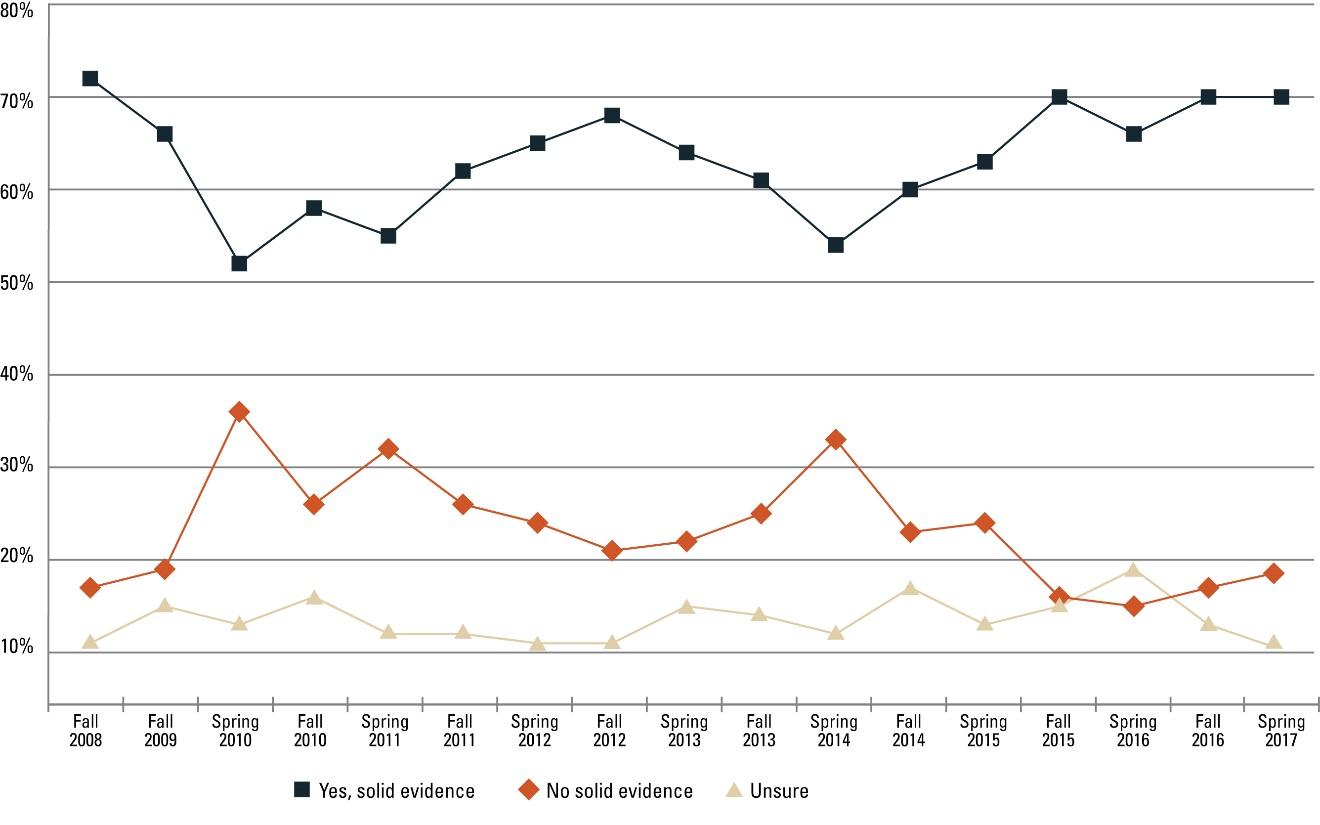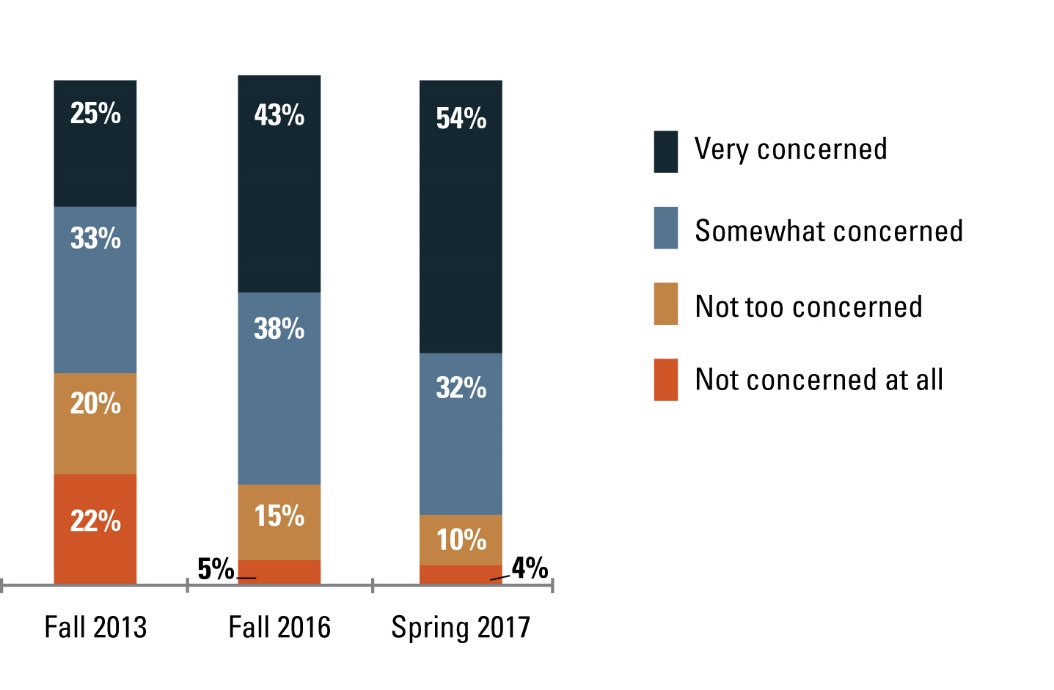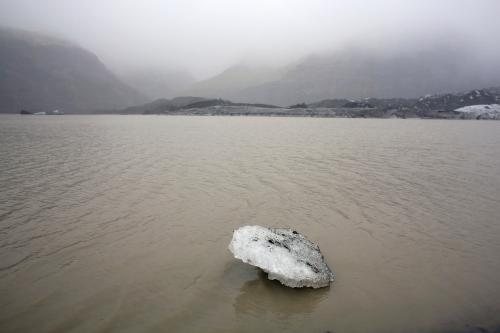Donald Trump appears to be part of a decreasing minority of Americans who do not have firm views on the existence of global warming. He skirted this issue in his lengthy speech announcing American withdrawal from the Paris climate accord. His senior advisors cannot seem to agree in providing interpretation. United Nations Ambassador Nikki Haley insists that the President believes global warming is occurring. But Environmental Protection Agency Administrator Scott Pruitt contends that the subject never came up in his numerous sessions with the President where they planned the Paris reversal.
So we are left to sift through past Trump speeches and tweets for insights into his views. By contrast, most Americans are increasingly clear in expressing their views, based on the Spring 2017 fielding of the National Surveys on Energy and the Environment (NSEE) from the University of Michigan and Muhlenberg College. It finds that during the months that White House advisors were debating the future of American engagement in greenhouse gas emission reduction, 70 percent of Americans indicated that they believe global warming is happening, a mark just shy of the 72 percent record set in 2008.
Figure 1: American views on the existence of evidence
of global warming, 2008-2017
Acceptance of global warming’s existence is widespread across political divisions in the United States. Majorities of Democrats, Republicans and independents state that there is solid evidence that temperatures on the planet have increased over the past four decades. The NSEE results show 83 percent of Democrats, 54 percent of Republicans and 69 percent of independents believe that global warming is happening. Conversely, only 10 percent of Democrats, 31 percent of Republicans and 21 percent of independents indicate that they do not think that there is solid evidence of global warming.
Figure 2: American views on the existence of evidence of
global warming, by party (Spring 2017)

The widespread acceptance of global warming among Americans has been accompanied by significantly higher levels of concern regarding this issue. Among those that think global warming is happening the percentage indicating that they are “very concerned” about the matter has risen by 11 points since the fall of 2016 (43 percent to 54 percent) and by 29 points since 2013 (25 percent to 54 percent).
Figure 3: American concern about global warming, 2013–2017
(among Americans who think global warming is occurring)
The very high levels of acceptance of global warming’s existence and rising concern about the issue among Americans may help explain Trump’s decision to never explain his views on global warming during his address. Instead, he focused almost exclusively on the perceived failings of the accord and its threat to the U.S. economy, linking that with other steps he has taken that he contends are transforming the American economy. He also asserted that he would be willing to launch entirely new international negotiations to reduce emissions, again without saying whether or not he thought global warming was occurring or represented a problem worthy of a policy response.
President Trump’s continuing aversion to explaining his views on the existence of global warming marks a key moment in the evolution of American political discourse on the subject. In the past decade, well-organized efforts to vilify virtually any American federal, state, or local policy designed to reduce greenhouse gas emissions have routinely combined dismissals of global warming with allegations that policy adoption would produce devastating economic impacts. So why did President Trump, who can be masterful in using doubt as a political tool, not attempt to sew skepticism about the existence of global warming as he unveiled his anti-Paris case before a friendly audience at the White House? The answer may rest in the American public’s evolution on the matter.
Americans in Spring 2017 are considerably more confident in their appraisal that global warming is occurring than they were during past battles regarding climate policies. The latest NSEE survey finds that 68 percent of Americans who currently believe global warming is occurring are very confident of their appraisal compared to only 47 percent that expressed such a view in late 2013.
Figure 4: Confidence that earth is warming, 2008–2017
(among Americans who think global warming is occurring)
In turn, the amount of evidence regarding climate change has significantly grown in recent years and is not solely confined to peer-reviewed science publications. For an American public that regularly cites their personal experiences and changes to the Earth’s physical landscape as key contributing factors to their views on climate change, record temperatures and continuing decline in polar ice has built broader and deeper acceptance that the planet is indeed warming.
President Trump may yet take to Twitter to challenge the existence of global warming and confront the widespread acceptance that Americans maintain regarding this matter. But he has remained remarkably quiet on this issue in recent months, leaving his top aides to try to interpret what he does and does not believe. Consequently, it seems that Trump’s announcement regarding the withdrawal from the Paris accord is not only a monumental policy decision but also a historic moment in the discourse on the issue. Unlike the American people, we still do not know what he thinks about global warming.
The Brookings Institution is committed to quality, independence, and impact.
We are supported by a diverse array of funders. In line with our values and policies, each Brookings publication represents the sole views of its author(s).












Commentary
Trump’s global warming views remain elusive, but not those of Americans
June 12, 2017